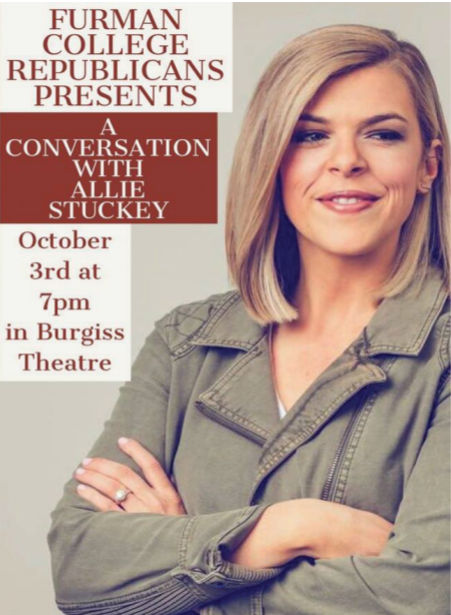Last Wednesday, political commentator and Furman alumnus Allie Beth Stuckey graced Furman’s Burgiss theatre with a break-down of the current political climate. According to the Furman College Republicans official instagram page, the talk welcomed “A Conversation with Allie Stuckey” who presented “How a Narrative is formed: Analyzing the Narrative of the Kavanaugh Hearings.” Stuckey, host of the “Relatable with Allie Stuckey” podcast, gives an in depth look at contemporary culture “from the perspective of a millennial Christian.”
Furman senior Hayden Wilson remarked, “I was super stoked to see this fabulous woman speak today!” The event had a reasonable degree of security, requiring students to leave their book bags at the door. However, as noted by one of the police officers, “We weren’t too worried about this event. We believe we had it all under control.”
She began with a discussion about general topics around today, from Trump to Kavanaugh, abortion to Alexandria Ocasio-Cortez. Eventually, she came around to politics on college campuses. She criticized the way that academia is predominated by liberals and argued that they suppress conservative voices on campus. She positively reflected on her time at Furman as a break from this experience, stating that her professors were open to different viewpoints and let conservatives be heard in their classes. However, she later lamented on the fact that she had heard things have been changing lately.
One professor in the audience asked about the ways in which she could be more inclusive and accommodating to students holding differing viewpoints. Stuckey responded that promoting an environment where left-leaning students would be open minded and willing to hear about conservative students would be ideal. In regard to college protests, Stuckey said “It’s never a protest of a liberal, by the way, or a leftist—it’s only conservatives.”
After Stuckey’s initial monologue on the political climate, the floor was opened to questions. The first 25 minutes or so of question time was consumed by left-leaning students who were eager to debate Stuckey. The dialogue engaged civilly with both sides being respectful. One student raised the position that in regard to the Kavanaugh hearing, he should not be placed on the Supreme Court because he allegedly sexually assaulted Christine Blasey Ford when he was 17. Stuckey responded that all people are innocent until proven guilty and deserve due process under the law. The rebuttal was, “I understand that, but I think that in the case of sexual assault, it’s different.” Stuckey sharply responded, “No. Doesn’t work like that. Not gonna fly.”
Another student accused Kavanaugh of partiality to Republicans. Stuckey pointed out his record of voting together with Merrick Garland, President Barack Obama’s 2016 appointee on 93 percent of cases.
Stuckey was asked: “I write for the school newspaper and am often worried about how professors and fellow students will perceive me due to publicly giving my opinions. As a Christian, I try to be honest, and as an American citizen, I try to vocalize my views. How can I balance the two without being judged?”
Stuckey responded with words of wisdom, typical of her usual political insights. “If you’re a Christian, I think your religious views should come first. You have to pick your poison though on college campuses, and decide which means more to you—political participation or class-standing.”
Additionally, Stuckey gave her thoughts on political correctness in the world today. “You can find me somewhere in the middle.” She expounded, “Not all political correctness is political correctness. For instance, I have a brother who is special needs—I hate the R-word. People say it’s politically correct not to say the R-word. I don’t think that’s politically correct, I think that’s just a matter of kindness. Now, in some instances, we have over-sensitized everything. We have put people in such insulated safe spaces that they cannot hear anything that they disagree with without absolutely erupting.”
Stuckey also went into detail with another student of how she got into the profession of what. She said she always enjoyed class presentations and public speaking while at Furman. After college, she did work in a similar field at UGA, and realized that this is what she wanted to do with the rest of her life. The presentation concluded with Stuckey posing for pictures with students.
